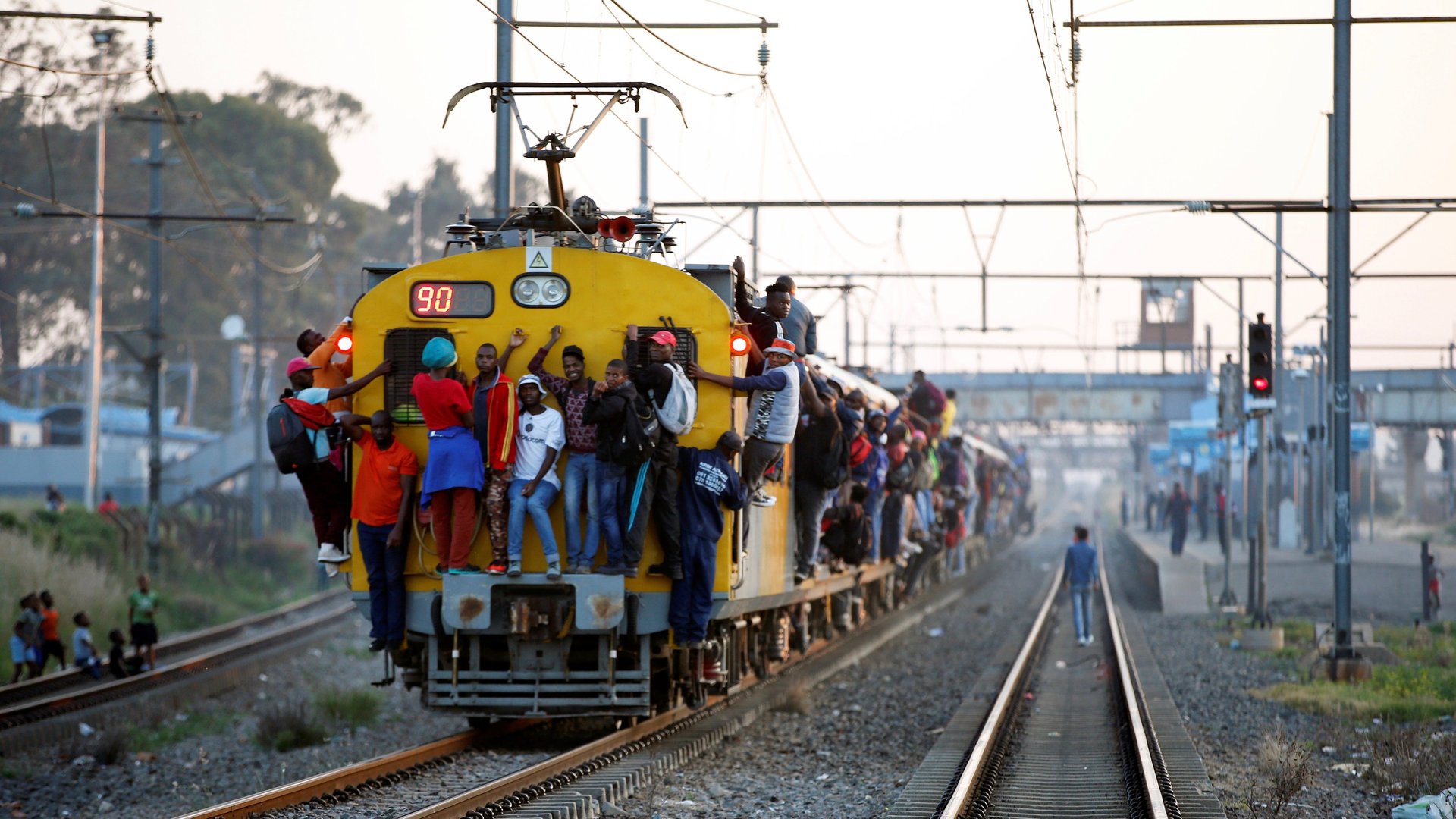The latest buzz phrase of South Africa’s elections: the “fourth industrial revolution”
South African politicians have become enamored with the “fourth industrial revolution”—a term often used to describe the intense technological transformation taking place in the world —turning to it as a campaign catchphrase ahead of the country’s May presidential elections.


South African politicians have become enamored with the “fourth industrial revolution”—a term often used to describe the intense technological transformation taking place in the world —turning to it as a campaign catchphrase ahead of the country’s May presidential elections.
Their message: The fourth industrial revolution is coming! And it will either take jobs, or create jobs, politicians say, depending on who the voters choose. Never mind that the exact meaning of the term is up for debate—and that this focus on the future fails to take into account the extremely pressing problems of South Africa’s present.
Young voters are acutely aware of their prospects in a changing world, and politicians have coopted the phrase to assure them that they have a plan. In his 2019 state of the nation address, president Cyril Ramaphosa appointed a commission (his go-to solution for South Africa’s ills) to look into the fourth industrial revolution, which he said is “transforming the way people relate to each other, the way societies function, and the way they are governed.”
South Africa’s unemployment remains stubbornly high, hovering around 27% for the past decade. In a country with an average age of 26, about half of South Africans younger than 35 are unemployed. Even in times of growth, it has struggled to create jobs and absorb a post-apartheid labor surplus.
Now, in and out of technical recession, prospects seem even more dire. The sectors that have grown, like financial services, create jobs for highly skilled workers, which does nothing to reduce unemployment among those most affected—young South Africans with a high-school diploma or less. Lower skilled jobs in agriculture and mining are becoming increasingly mechanized, requiring fewer workers. This has only fueled young people’s anxieties about the technological changes ahead.
In its campaign manifesto, the main opposition party, the Democratic Alliance (DA) mentions (pdf) how it will harness the fourth industrial revolution to prepare children for the future job market, increase access to the internet and foster innovation for job creation. Yet, when the DA launched their manifesto, the bulk of leader Mmusi Maimane’s speech focused on the failures of the ANC.
The DA has increasingly cut into the ANC’s voting majority since 1994, winning three major metros in the 2016 municipal election. It governs the Western Cape, where much of South Africa’s tech development is centered, and has helped to grow nascent tech industry into one of the largest on the continent. But the region’s start-up ecosystem reflects South Africa’s racial disparity, a criticism that has dogged much of the DA’s policies.
The country’s third largest political party, the leftist nationalist Economic Freedom Fighters, views technology and innovation as part of the country’s broader development. In an exhaustive 170 page election manifesto, the young party, which doesn’t yet have governance experience, envisions the digitization of state services for everything from universities to municipalities, and plans to integrate technology unto classrooms and policing. They also plan to establish special economic zones, in which manufacturing will be encouraged, with the dream that South Africa will soon build its own mobile phone.
Playing to his young base, EFF leader Julius Malema has also focused on the price of data: “Data is expensive in South Africa. You buy MTN data now and when you wake up tomorrow, it has grown legs,” he told crowds in Pretoria at the party’s election manifesto launch in February.
The ruling ANC, for its part, has outlined a plan to tackle this major “digital transformation” through a Presidential Digital Industrial Revolution Commission (pdf), which aims to rework the regulatory and legal framework for communication technologies, increase spending on innovation, and support e-commerce. The promise to reduce the high cost of data is likely to resonate with young people in a country in which more than half the population access the internet via their phones.
The ANC’s ambitions, however, might be checked by its own record on infrastructure, evidenced at the moment by the extensive rolling power outages hitting South Africa. In a February speech to parliament, country and ANC deputy president David Mabuza delivered a speech that was meant to highlight how young people were already being trained in “disciplines include coding that are analytics and block chain.” He was interrupted by a opposition politician who pointed out that all of this required electricity. Politicking aside, it highlighted South Africa’s lack of preparedness for this digital shift.
South Africa’s ICT tech sector is the most valuable on the continent, worth an estimated $7.3 billion in 2017, according to government data. Multinational companies like IBM, Dell and Microsoft all have multinational subsidiaries here. If the fourth industrial revolution were a straightforward economic shift, this would be a boon.
But it’s not straightforward. Major technological disruption is already happening. It has manifested in our increasing reliance on digital technology, which is changing our every day lives. By any definition, South Africa is not ready, and its politicians’ plans reflect a naivety about the extent of this disruption, and the advantages and disadvantages it presents. The fourth industrial revolution will not happen in isolation to South Africa’s existing infrastructure and socio-economic issues—and citing it isn’t a catch-all solution for voter’s woes.